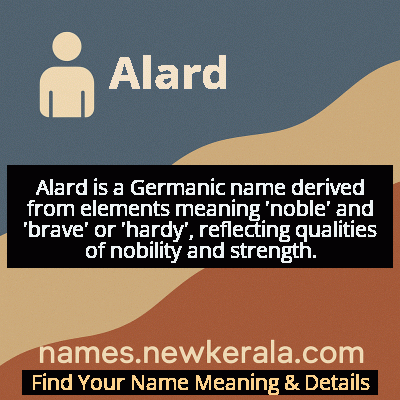Alard Name Meaning & Details
Origin, Popularity, Numerology Analysis & Name Meaning of Alard
Discover the origin, meaning, and cultural significance of the name ALARD. Delve into its historical roots and explore the lasting impact it has had on communities and traditions.
Name
Alard
Gender
Male
Origin
Teutonic
Lucky Number
9
Meaning of the Name - Alard
Alard is a Germanic name derived from elements meaning 'noble' and 'brave' or 'hardy', reflecting qualities of nobility and strength.
Alard - Complete Numerology Analysis
Your Numerology Number
Based on Pythagorean Numerology System
Ruling Planet
Mars
Positive Nature
Generous, passionate, energetic, and humanitarian.
Negative Traits
Impulsive, impatient, moody, and can be overly emotional.
Lucky Colours
Red, maroon, scarlet.
Lucky Days
Tuesday.
Lucky Stones
Red coral, garnet.
Harmony Numbers
1, 2, 3, 6.
Best Suited Professions
Military, sports, philanthropy, leadership roles.
What People Like About You
Courage, energy, leadership, generosity.
Famous People Named Alard
Alard of Corbie
Benedictine monk and scholar
Abbot of Corbie Abbey in France, known for his theological writings and monastic reforms
Alard de Cambrai
Knight and nobleman
Prominent Crusader who fought in the Third Crusade under Philip II of France
Alard de la Tour
Architect and engineer
Designed several Gothic cathedrals in northern France, including additions to Notre-Dame de Paris
Alard V of Guînes
Count and ruler
Count of Guînes who significantly expanded his territory through strategic marriages and military campaigns
Name Variations & International Equivalents
Click on blue names to explore their detailed meanings. Gray names with will be available soon.
Cultural & Historical Significance
During the High Middle Ages, bearers of the name often held positions of authority in both secular and religious contexts, serving as counts, knights, abbots, and scholars who helped shape medieval European society. The name's association with nobility and resolve made it particularly popular among crusading families and those involved in the complex feudal relationships that defined medieval Europe. Its usage in monastic contexts also demonstrates how the name transitioned from purely aristocratic to encompass intellectual and spiritual leadership, reflecting the evolving nature of medieval society where religious and secular power were deeply intertwined.
Extended Personality Analysis
Individuals named Alard are typically characterized by a strong sense of purpose and unwavering determination. They possess an innate nobility of character that manifests as integrity, honor, and a natural leadership quality that others find compelling. These individuals often demonstrate remarkable resilience in the face of adversity, drawing from deep inner reserves of strength that align with the name's etymological meaning of 'resolute noble.' Their decision-making process tends to be deliberate and thoughtful, combining strategic thinking with moral conviction.
Alards are often perceived as pillars of stability in their communities or professional circles, offering reliable counsel and demonstrating loyalty to their principles and relationships. While they can be reserved in expressing emotions, their actions consistently reflect their core values and commitment to those they care about. This combination of intellectual rigor and emotional steadfastness makes them particularly effective in positions requiring both analytical thinking and interpersonal reliability. They tend to excel in fields where tradition and innovation must be balanced, such as law, academia, historic preservation, or leadership roles in established institutions.
Modern Usage & Popularity
In contemporary times, Alard remains a relatively rare but distinguished choice, primarily used by families with European heritage or those seeking a name with historical depth and aristocratic connotations. While it never achieved widespread popularity like other medieval names that experienced revivals (such as Arthur or Henry), it maintains a steady presence in certain regions, particularly in France, Belgium, and parts of Germany. According to naming statistics, the name appears most frequently in genealogical research and among families with specific interest in medieval history or Teutonic heritage. In recent decades, there has been a modest but noticeable increase in its usage among parents looking for unique yet traditional names with strong etymological roots, particularly in academic and historical circles. The name's rarity in modern times adds to its distinctive appeal, making it an excellent choice for parents seeking a name that stands out while carrying centuries of historical significance without being overly common.
Symbolic & Spiritual Meanings
Symbolically, Alard represents the enduring qualities of nobility, resilience, and moral fortitude. The name embodies the archetype of the 'noble warrior' – not merely in the martial sense, but as someone who battles for principles, justice, and truth. It carries connotations of steadfast leadership, suggesting an individual who remains unwavering in their convictions while maintaining grace under pressure. The combination of 'noble' and 'resolute' in its meaning creates a powerful symbolic duality: the nobility represents the higher ideals and ethical standards, while the resoluteness signifies the strength and determination required to uphold those ideals in practice. This makes the name particularly symbolic for individuals who bridge tradition and innovation, combining respect for established values with the courage to forge new paths. In contemporary contexts, Alard symbolizes the transmission of European aristocratic and intellectual traditions across generations, serving as a reminder that true nobility comes not from birthright alone, but from character, conviction, and the resolve to make meaningful contributions to society.

